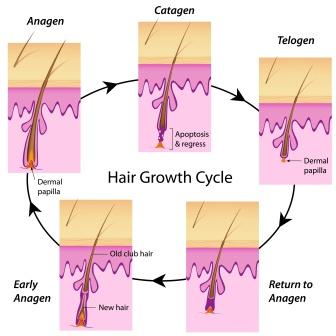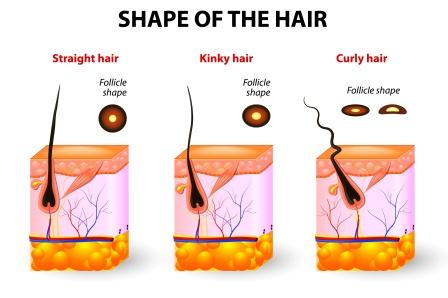Description Of Hair And Its Importance As Per Ayurveda
Article by Vd.A.Rangaprasad Bhat.
Table of Contents
Normal hair growth pattern
Pattern of Normal Hair growth cycle:-
Hair follicle growth occurs in a specific pattern of cycles. Each growth cycle starts with a long growing phase (Anagen – Keshodbhava avasthA) a short transitional phase (catagen – kshaNika avasthA) and a short resting phase (telogen – pratiSHTA avasthA). At the end of cycle, the hair falls out (exogen – patana avasthA) and a new hair starts growing in the follicle beginning the cycle (i.e. anagen- catagen – telogen – exogen) again.

Research studies suggest the finding that normally on average 40 hairs reach the resting phase aka pratiSHTA avastha and fall out, each day. In men the number of hairs falling vary from 0—70.
When about 100 or more of the hairs fallout per day the clinical hair loss of kesha patana (telogen effluvium) occurs. While, the growing phase (keshodbhava avastha) gets pathologically disrupted abnormal loss of hair like indralupta or khalityam (anagen effluvium) occurs). The pathological disruption caused may be due to kehsAda, lomAda etc krmis, or due to the tejoanilAdaya doshas.
As per Ayurveda, hair originates from the paitruka – paternal influence. Hair or body hair is considered as a
1. Mala of asthidhatu by Charaka – waste product of bone tissue
2. As an upadhatu of majja by Sarangadhara. – Sub tissue of marrow

Characteristics of hairs
The prashastha kesha lakshanas are, susnigdhata (unctuous), mruduta(soft),
Sookshmata(slender), naika moolatwa(not with a single root) and sthiratwa(attached strongly to the follicle).
Features of hair as per body types:
Vata prakruti
Alpa kesha(scarcely distributed hairs),
Rooksha kesha (dry hairs),
Sphutita kasha (split hairs),
Parusha kasha (rough hairs) and
Dushara varna (gray coloured).
Pitta prakruti
Tanu (thin / slender),
Mrudu (soft), alpa(less),
Pinga varna (tawny coloured) and
Kapila varna (brownish red coloured).
Kapha prakruti
Stira(stable/firmly attached to the follicle),
kutila(curly),
Ghana (compact or thick) and neela varna (black/ blackish blue tinged).
Kesha according to Sara
SAra and its interpretation through clinical examination of Kesha:
During the examination of the patient the quantum of sAra too gets adjucated for selecting remedial measures. Acharya Charak mentions eight types of sAra in humans which helps to assess the quantum of strength are related to the following structures and entities namely – sAra of twak, rakta, mamsa, medas, asthi, majja, sukra and sattwa.
Acharya Charaka describes the nature of kesha according to sAra also.
Twak sara purusha
Features of Kesha in Twak sAra humans: –
Snigdha, slakshana, mrudu, prasanna, sookshma, alpa, gambheera and sukumara kesha.
Meda sara purusha
Features of hair in Meda sara humans:-
Snigdha kesha – oily, shining unctuous hair
Vd.A.Rangaprasad Bhat,
Chief Physician,
PADMANILAYAM, 49/46, K.M.N St,
Mandavelipakkam, Chennai-600028
Email: [email protected]










7 comments
Abinaya
Hai Sir,
I have very thin, dry and short hair with dandruff. Kinldy suggest me ayurvedic hair pack to promote hair growth.
Abinaya
Thank you so much sir..
Abinaya
Thank you Sir. Need to apply this powder on dry hair or oiled hair.
Dr J V Hebbar MD(Ayu)Author
Because you will be making the paste of the powder with the oil itself, no hard rule that it should be applied on oiled hair only. But it can also be applied on oiled hair.
Abinaya
Thank you sir.
Dr.Sreeraj Rajendran
Dear Doctor,
Can you please give me a reference on the karma ( role ) of Hairs in the body, in the classical texts?
Dr.Sreeraj. K.R
Dr J V Hebbar MD(Ayu)Author
It is explained as Asthi Mala. Other than that, I have not come across its specific role.